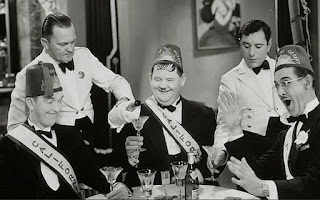HMRC - Sparkling Testimonials
Yesterday, I caught up with some of the old crew from H.M Revenue and Customs. None of us got the last day at work we'd always imagined. The pandemic and working-from-home had put the icing on the cake of the satirically named 'Building Our Future' programme of office closures. Instead of handing in our building passes and spending the afternoon across the road in the Railwayman's Arms, we'd shut down our Surface Pro's and bid a socially distanced farewell to the IT contractor who called at our homes to pick them up.
If you can say there's an upside to a plague, the Covid emergency has at least convinced some of the more enlightened warrens of HMRC that it's possibly to do an honest day's work from home. So, a handful of HMRC staff have kept their jobs, even though their office has gone. And those who took redundancy because they were told it was impossible to work remotely, have at least found other jobs.
Compared to the ones still working at HMRC, they feel lucky. I'm still hearing that staff are being pushed onto helplines rather than being given time to get their head round the actual work. Some senior managers honestly believe that there's no need for staff to get to know a work area because some streamlined training and a system of automated prompts will carry them through. But, something in my bones tells me there are other senior managers who think there's no point in wasting time letting staff learn the work. Because now that 90% of HMRC staff are concentrated in cities, once the pandemic eases they'll be off across the road to someone who pays better.
As for the newly redundant, the main upset was their testimonial letter from HMRC.
OK - this is the point where some people will say "Get out the violins " but redundancy is a sensitive subject. As part of the "offboarding" procedure, everyone's supposed to get a "thank you" letter when they leave, reviewing their years of faithful service. Hopefully signed by a senior manager.
The only problem is that their outgoing line manager is supposed to pull that letter together. And HMRC has been offboarding line managers as readily as a porcupine shedding quills. That means staff in their final year are likely being managed by someone who doesn't know who they are and increasingly doesn't understand the work they're doing now, let alone something they might have done 30 years ago.
Of course, there was no continuous staff file to refer to . Digital by default, the rationalisation of HR, the merger of Customs and Excise and the Inland Revenue, and the constant ebb-and-blow of online systems had created a system where the paper files had been trashed and the digital records didn't add up. (And no, this isn't just a Civil Service problem. The Civil Service has spent 30 years imitating private industry - sorry - taking best practice from private industry). This had potentially serious consequences when it came to calculating years of service for part-time staff and (tip for present-day staff) some could only prove they'd worked longer than HMRC thought because they'd squirrelled their paper wageslips and P60's away in rubber-banded bundles in the airing cupboard.
But it also meant there was no staff file to refer to when it came to summing up a career. A difficult job for the managers when some of them weren't even born when the staff started working for the Civil Service.
In the end, some of the managers (higher grades who obviously had more important things to think about) addressed the problem by just not issuing a "thank you" letter. And, now that I've had time to think about it - would a continuous staff file really have given a positive picture of my career. I know there have been times when I've disappointed managers by not "seeing the bigger picture".
In the end, I surprised myself by printing off some feedback I'd solicited as part of the staff appraisal process. At the time - like most people - I'd hated having to touch someone up for a compliment so that my line manager would have some "evidence" to support my box marking. But as I looked back through the pages they were true testimonials - an acknowledgement from someone who understood the work I'd done, and valued it. What more could you ask for?




